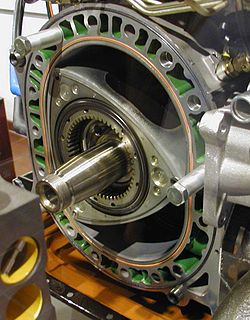Since the classic 1976 Suzuki RE5 Rotary (check it out here: http://www.motorcyclemuseum.org/classics/bike.asp?id=39) dropped off the face of the Earth, no one has really talked about the use of the Wankel Rotary Engine in bikes much. Mazda has been struggling to help people see the efficiency of the Wankel Rotary engine and even lowered their standards by making the RX series more family-oriented. The RX-8 is now a 2+2 setup, lost it's turbochargers, and gained a bit of weight since the re-design. Quite the downgrade if you ask me or anyone else concerned with performance.
Rotary engines put an outrageously higher power/litre ratio than V-engines OR inline engines (Check out all the advantages here: http://en.wikipedia.org/wiki/Wankel_rotary)! Modern technology can keep the weight down and provides opportunities for the best efficiency. Rotary Engines can now adapt a fuel injection system that avoids the overly-complex carburetor systems of yester-year and advances in technology can stop all the reasons why the RE5 died out. There are independent companies that make project bikes for drag or track, but why not mass-produce them? Each Mazda rotary is approximately .7L (RX-7, RX-8 used two rotors for a 1.3L and 1.4L displacement, respectively) and put out approximately 120hp/rotary unit without tunes or upgrades!. A 1.4L can put out over 300hp that out-revs a Harley (well, a lawn mower can out-rev a Harley so that isn't much of an improvement)!
So the engine is light, puts out more power/Litre, easy to disassemble, and has been put in a bike before. Why not do it again? Maybe it can be done right this time around.
![Image]()
![Image]()
Rotary engines put an outrageously higher power/litre ratio than V-engines OR inline engines (Check out all the advantages here: http://en.wikipedia.org/wiki/Wankel_rotary)! Modern technology can keep the weight down and provides opportunities for the best efficiency. Rotary Engines can now adapt a fuel injection system that avoids the overly-complex carburetor systems of yester-year and advances in technology can stop all the reasons why the RE5 died out. There are independent companies that make project bikes for drag or track, but why not mass-produce them? Each Mazda rotary is approximately .7L (RX-7, RX-8 used two rotors for a 1.3L and 1.4L displacement, respectively) and put out approximately 120hp/rotary unit without tunes or upgrades!. A 1.4L can put out over 300hp that out-revs a Harley (well, a lawn mower can out-rev a Harley so that isn't much of an improvement)!
So the engine is light, puts out more power/Litre, easy to disassemble, and has been put in a bike before. Why not do it again? Maybe it can be done right this time around.






